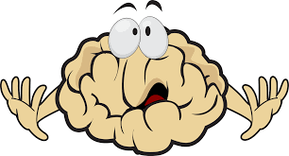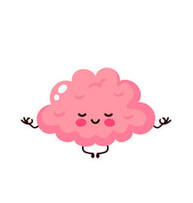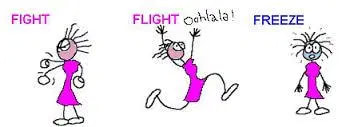
When our body identifies that something is dangerous it switches to our older system of fight, flight or freeze, switching off the slower, but more sensible, parts of our thinking brain. Normally, we revert to being able to use our brain again very quickly, integrating what scared us with the facts we know about the world - it's a common experience. But when the external stressors are endless, and take many forms, the body can become stuck in a traumatic loop of these ancient responses.
Some will lash out at others, be angry at government, or be aggressive towards those they perceive as either under or over preparing for a lock down, or adhering correctly or incorrectly to self-isolation rules. This is the fight response, where people who's deepest instincts tell them the situation is scary, and the way to deal with it is with an angry attack mode. It can create a volatility in people that can scare those around them, or in fact, lead to overt aggressive behaviour.
There are those who start to panic buy, to implore those around them to stay isolated, who are fearful for their health and the health of others. This is a flight response. The response to the fear these people experience is to run and protect and to prepare. They will feel a need to discuss the situation at length, repeating the same things over and over, reading every snippet of information (factual or otherwise) until they find themselves in a state of panic.
There are those who think the Covid-19 virus is just a flu, that there's really nothing to see here, that we're all just overreacting, or they just don't want to know about it. Or they avoid thinking about it at all and act as if the new rules don't apply to them. That is a freeze response. It's the classic head in the sand approach, where ordinary reactions are shunted to a person's blind spot and ignored. These are the ones being targeted by the rules and laws and fines as without that very real external reality being hammered into them, they simply either won't get it, or won't comply, putting everyone at risk, through no ill intent on their part.
None of these responses are logical, and none of them are helpful. Once you're in fight flight or freeze, you're now operating at a primitive nervous system level, without your higher brain functions online to help you determine what's going on and how to operate in a more regulated and practical way, a place where we're able to make decisions about our behaviour rather than simply reacting.
Under ordinary circumstances, when we hit a fight, flight, or freeze moment, the situation around us soon resolves and we come back online and can again operate with all our faculties. That's where the current situation presents difficulties - the situation around us is in fact somewhat dangerous, the information we're being given is evolving at a rapid pace, and people around us can be acting bonkers. The world is no longer predictable or reliable, and so we react with our built in fear system and may not know how to get out of it.
Here are some ways to bring yourself back to a place of being present, making decisions, and gaining some ability to navigate the lock down environment.
They involve acting from the "Bottom up," a process first identified by Bessel Van Der Kolk. When in a fight, flight, or freeze response, there's no way to think rationally, and even finding the words to describe how you feel can be difficult. Not having access to your thinking brain makes things very difficult! Likewise, telling some to "just be sensible," or "just work it out" isn't going to work either. We have to calm our body first, and then our brain can be there for us again.

- Breathe. Take long, slow breaths. Breathe in deeply and exhale slowly. Be aware of your breathing. Do it several times a day. (Actually, long, slow exhalation activates the parasympathetic nervous system - the anti-fear system that triggers your physical system to calm down.) I recommend practising breathing every single day so you become familiar with it, know how to notice it, and can breath with intent when you need to calm down.
- Do some slow and methodical side to side swaying. Notice and relax your body as you do it. Take 5 minutes in the morning and 5 in the evening to try this - it really helps your body to calm, and to ensure your brain and body remain integrated.
- Find music and natural scenes that you know bring you to a calm state. Each day, actively seek out that calm place when the sounds you can hear bring you peace.
- Use your sense of smell. In the home, while cooking, or out on a walk, notice the scents around you and pay attention to them. Is there one you really like? Incorporate it into your other relaxation moments.
- Exercise for 10-15 minutes each day. This isn't for fitness, but for the hormones that are produced by this - serotonin and dopamine - as they make you feel good. Walking at a brisk pace (think late-ish for a train or bus) is perfect as it also uses up all the excess adrenaline and cortisol that the stress is producing. A 15 minute walk per day is enough to make a difference.
- If you know how to meditate, this is the time to do it. If you don't this is a great time to learn.
Now that you know how to calm, it's time to notice when you're not.
- Notice and acknowledge that you've had a response that isn't helping. Try to see if it's freezing, or fighting, or fleeing. Try to think about your thoughts and try to understand what they are - that simple act can begin the process of brining you back online. Try to name the feelings you have - they will be simple, like scared, sad, or lonely. Incidentally, that also the best way to help others in this situation. Acknowledge that they're in a nervous system response state, and just be with them, kindly, and ask how they feel.
- Notice what your body is doing. If you are in fight flight or freeze, your heart will beat faster, your breathing will become faster and more shallow, you may feel a tightness across the chest, and your temperature may increase. The body can tell you that it's panicking once you learn to read the signs. You can also become good at predicting when you're most likely to go into this state and be able to take actions to prevent it happening.
These 8 things revolve around an understanding of the fight, flight, freeze response which can help empower you. They also encompass mindfulness techniques that are proven to trigger the systems in our bodies that bring calm.
Once you can master this, you will be equipped to navigate everything this throws at you and remain logical, able to make decisions, and in control of your reactions. Along the way you will likely stumble as we humans tend to do. That's ok - these systems are hard-wired and totally natural. Of course they sometimes take the lead. So if that happens, be kind to yourself - you didn't fail, you just managed to be human.
Feeling anxious and feeling the depression that may come around later is a new thing for many people. If you find yourself unprepared to deal with your reactions, and are feeling overwhelmed, know that Counsellors and Psychotherapist are Allied Health Professionals who are operating throughout the Coronavirus pandemic. Video and telephone sessions are available, and you're allowed to attend appointments in person as well in NSW.
Have you realised you've been operating in one of these states? How did you realise it? How have you been able to calm yourself?
Comments welcome below.


 RSS Feed
RSS Feed